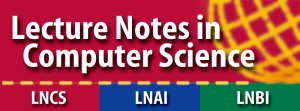CALL FOR PAPERS
Main topics
We invite submissions of original and previously unpublished research on rough set theory, including but not limited to the following topics:
|
Core rough set models and methods |
|
|
|
|
Related methods and hybridization |
|
|
|
|
Areas of application |
|
|
|
Submission details
We accept two types of submissions:
- Extended abstracts will be published in the online pdf book of abstracts.
- Full-length papers (12-15 pages) will be published in the LNCS/LNAI Springer post-proceedings.
Both types will be treated equally when designing the conference program of oral presentations.
Further details on extended abstracts:
Extended abstracts should include 1-4 pages and may describe work-in-progress as well as research that has been published else-where during the past year. Extended abstracts will not be included in the post-proceedings. They will be published as a digital book of abstracts on the conference website. Extended abstracts must be presented at the conference to be included in the book. Extended abstracts should be prepared following the same format as full-length papers, using either the Latex or the Word templates from Springer, which can be found on the Springer authors’ page. LaTex templates are available in Overleaf.
Additional details will be updated once available.
Further details on full-length papers
Full-length papers (12-15 pages) will be published in the LNCS/LNAI Springer post-proceedings. Papers with more than 15 pages may be accepted. Papers must be original and not simultaneously submitted to another journal or conference. Each submitted paper will be reviewed by at least three independent and anonymous reviewers. All accepted papers must be presented at the conference, and will be published in the conference post-proceedings, both in print and digitally. Accepted papers will be shared for exclusive use of the conference participants during the conference.
All submissions must follow Springer’s Instructions for Proceedings Authors and use either the Latex or the Word templates, which can be found on the Springer authors’ page. LaTex templates are available in Overleaf. All submitted works should follow Springer’s Code of Conduct .
For authors who are interested in publishing open-access papers, please refer to Springer’s webpage for prices and additional information.
Previous IJCRS proceedings can be found at the following link https://link.springer.com/conference/ijcrs.


Important dates
Workshops proposals:
- Submission deadline: November 7, 2025.
- Notification of acceptance: November 21, 2025.
Special session proposals:
- Submission deadline: December 28, 2025.
- Notification of acceptance: January 2, 2026.
Full-length papers:
- Submission deadline:
January 9, 2026January 31, 2026. - Notification of acceptance: March 3, 2026.
Extended abstracts:
- Submission deadline: March 6, 2026.
- Notification of acceptance: March 27, 2026.
Submission instructions
The instructions for the submissions of works for IJCRS26 are listed below.
- Register or log in to the webpage: meteor.springer.com/ijcrs2026
- Click on the tab “My Papers” on the top and click on “Add paper”
- Add the paper title, subtitle (if necessary), paper type and track, and click on “Save”
- Your paper should appear on the list. Click on it, follow the steps on screen and submit your work

